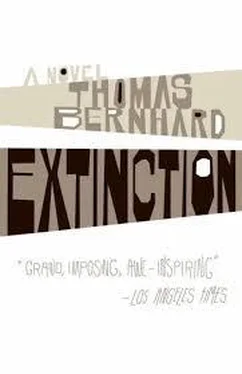My sisters Amalia and Caecilia at Uncle Georg’s villa. I last went to Cannes in 1978. I visited Uncle Georg at least once a year. A few days spent with him at his villa always did me good. To the horror of the family, he designated his manservant, whom he always called affectionately
my good Jean, as his sole heir. On several occasions Uncle Georg came to see me in Rome, a city that we both loved and appreciated more than any other. Gambetti and he got along well with each other and spent many evenings on the Piazza del Popolo or, if it was raining, at the Café Greco, discussing
everything imaginable, especially painting. Uncle Georg was a keen collector, and I know that he spent the interest from his investments largely on acquiring pictures and sculptures by contemporary artists. Thanks to his good taste and a quite extraordinary instinct for the value of the works of art he preferred, his passion for collecting soon brought him a second sizable fortune, amounting literally to millions. The unknown artists he patronized became famous soon after he had more or less discovered them and brought them to public notice by buying their works. Uncle Georg had no time for the
primitive business sense of my family; he abhorred the yearly exploitation of nature that goes on in the country, and he despised the centuries-old traditions of Wolfsegg — the production of meat, fat, hides, wood, and coal. Most of all he detested hunting, which was a ruling passion with my father and my brother (his brother and his nephew). Of all detestable passions, he had the profoundest detestation for hunting. Whereas his parents and his brother were devotees of hunting, Uncle Georg always refused to join in their sport. Like me he did not eat game, and when the others were out hunting he would shut himself in one of the libraries and divert his mind from their hunting excesses by intensive reading.
Whilethey were out killing deer, he would say,
I was sitting in the library reading Dostoyevsky, with the shutters firmly closed so as not to hear the shooting. Like me Uncle Georg loved Russian literature, especially Dostoyevsky and Lermontov, about whom he had some perceptive things to say, and he read and reread the revolutionaries Kropotkin and Bakunin, whose memoirs he thought the best in the genre. It was he who introduced me to Russian literature, about which he was very well informed, being as well versed in Russian as he was in French. It was from him that I acquired my love of Russian literature, and later of French literature. Indeed, I owe much of my mental capacity to him. At an early stage Uncle Georg opened my eyes to the rest of the world, so to speak, and made me aware that there was something else beyond Wolfsegg and beyond Austria, something far more splendid, far more tremendous, and that the world consisted not just of one family, but of millions of families, not just of one place, but of millions of places, not just of one people, but of many hundreds and thousands of peoples, each in its own way more attractive and more important than the others. The whole of humanity teems with countless beauties and possibilities, he said. Only an imbecile believes that the world stops where he stops. Uncle Georg not only introduced me to literature and opened it up as an
infinite paradise, he also opened my eyes to the world of music and the arts generally. It’s only when we have a proper concept of art that we have a proper concept of nature, he said. It’s only when we can
apply the concept of art correctly and enjoy art that we can make proper use of nature and enjoy it too. Most people never acquire even the most rudimentary concept of art, and so they never understand nature. The ideal contemplation of nature presupposes an ideal concept of art, he said. People who claim to see nature without having a concept of art see it only superficially, never in an ideal way, in its infinite splendor. For a thinking person it is possible first to arrive at an ideal concept of art by way of nature, and then to arrive at the ideal contemplation of nature by way of the ideal concept of art. On our visits to Italy, Uncle Georg, unlike my father, did not rush me from one column to another, one monument to another, one church to another, one Michelangelo to another. He never took me to see a work of art. I owe my understanding of art to him precisely because, unlike my parents, he never dragged me from one famous work of art to another. He never pestered me with them but simply pointed out that they existed and told me where they could be found, instead of bashing my head against some column or some Greek or Roman wall, as my parents constantly did. Having been bashed against so-called famous antiquities from early childhood, my head soon became quite insensitive to art of any kind; my parents’ head-bashing brought me no closer to art, but only sickened me with it. It took me years to set my head right after it had been brainlessly bashed against hundreds and thousands of works of art. If I had been under Uncle Georg’s influence as a child, I thought, when my parents were indiscriminately stuffing everything into my head, I would have benefited greatly. But the fact is that I had to be virtually destroyed by my parents before I could be cured by Uncle Georg, by which stage I was over twenty and, it seemed, hopelessly lost. By the time I realized what Uncle Georg meant to my future and my whole development, I was almost beyond treatment. I ultimately owe my salvation not only to my resolve to get away from the destructive ambience of Wolfsegg and halt the damage inflicted on me by my parents but also to Uncle Georg’s perspicacity. The result was that in adulthood, instead of being forced into the kind of life my family led, I was able to lead an entirely different one, like Uncle Georg’s. They hated Uncle Georg as long as he lived, and in the last ten or twenty years they took no trouble to conceal their hatred. In due course they treated him exactly as they treated me, thought of him as they thought of me, and went behind his back as they went behind mine. But he was not beholden to them in any way. One day, having settled his financial affairs, he boarded a train and went to Nice. There he rested for a few weeks, and then, fully refreshed, as he often said, he looked around for a place that would suit him. It had to be by the sea, set in a large garden, with the best air, but with good transport connections. His first picture postcards were sourly received at Wolfsegg. My family had visions of Uncle Georg lolling in the sun or strolling on the beach in linen suits, made to measure by Parisian tailors, of course, and in their dreams, which of course were always nightmares, they saw this
good-for-nothingrogue, as they called him, walking into banks at smart Riviera resorts to collect the interest on his ever-growing fortune. They were too stupid to believe that anyone could lead an intellectual existence. Uncle Georg led one, as is attested by some hundred notebooks that he filled with his thoughts and observations. The narrowness of the Central European, who lives to work, as they say, instead of working to live, and without ever pausing to wonder what is meant by work, soon got on Uncle Georg’s nerves, and he drew the unavoidable conclusion. Marking time was not for him. One must let fresh air into one’s mind, he used to say, and that means letting the world into one’s mind, day after day. At Wolfsegg they never let fresh air — or the world — into their minds. Stiff and rigid by nature, they sat stiffly and rigidly on their estate, their life’s mission being to ensure that this immense mass of inherited wealth progressively solidified and under no circumstances dissolved. In the course of time they all took on the rigidity and solidity, the absolute hardness, of this mass and fused with it into a dreadful, sickening unity, without even noticing what was happening. Uncle Georg noticed, however. He wanted nothing to do with this mass of wealth. He waited for the propitious and probably ideal moment when he could detach himself from the Wolfsegg mass. They had, as I know, suggested to him that instead of withdrawing his inheritance from Wolfsegg he should settle for a more or less guaranteed pension. But his perspicacity saved him from doing anything so foolish. When the need arises, people like my parents are never more unscrupulous than in their dealings with members of their own families. They recoil from no baseness, and under the cloak of Christian principle, high-mindedness, and social conscience they are merely rapacious and treat anyone as fair game. Right from the beginning, Uncle Georg failed to fit in with their plans. They were actually afraid of him, because he had seen through them at an early stage. Even as a child he had caught them out in their underhanded dealings, with which he was never afraid to reproach them. He is said to have been
Читать дальше












